Politics 2.0 – How the Obama Campaign Won the Internet
The US Presidential elections 2008 are historic in many ways – A black man had to beat a woman to claim the nomination of his party, the campaigns already spent more than a billion dollar to persuade voters, the final month of the election coincides with the collapse of the credit markets and the global economic system is threatened in its entirety.
Also, this election is increasingly fought out not on the TV screen or in newspaper editorials and op-eds, but on the Internet – which adds another historic element. German journalist Tobias Moorstedt has travelled the US to find out more about this development and the changes, challenges and criticisms digital campaigns evoke. He touches on all of these questions in his new book and in the following interview with tapmag (you can also read the interview in German on my private blog).
tapmag: Your new book is called „Jeffersons Erben“ („Jefferson’s Heirs“). You discuss the influence that the Internet and other new media have on political elections in the US. How can this change be described and what does it mean for voters and candidates?
Tobias Moorstedt: The net brings change to our private life (Instant Messaging), the entertainment industry (MP3) and the economy as a whole (Amazon). Who could imagine getting through university without the help of Wikipedia and Google nowadays? Email, Skype and webcams let us stay in touch with friends across the globe. Why should the new information technologies and the change they bring leave the political system untouched? After all, this system is based on the exchange and processing of information.
In a nutshell: The Internet has made it easy to collect ever more data, to share it with other people and to organize action with those people. Just think about the tedious process of political action fifteen years ago – you had to design a leaflet, produce copies and distribute it. Today, you just write an email to an audience which size is technically infinite.
tapmag: Who are Jefferson’s heirs and what connects them to the ideals of the American Founding Fathers?
Moorstedt: On my journey through the Internet (and the real USA) I met very different people who are all politically active on the net; a student from Texas who isn’t of voting age yet, but is campaigning for Obama in his conservative community nonetheless, a blogger who reaches hundreds of thousands of readers by the click of his mouse, a computer engineer who dreams of programming a new constitution.
Almost none of these net activists invoked Thomas Jefferson or Benjamin Franklin, but they might be surprised how many beliefs they share with the Founding Fathers. Jefferson called Information the currency of democracy. He tried to find ways to directly include citizens into the decision making process of the government – and thus educate them to be better, more responsible citizens.
Also, I think he would have liked the energy and passion of the bloggers and activists. He once remarked: “I like a little rebellion now and then. It is like a storm in the atmosphere.”
tapmag: Barack Obama was able to reach out to a lot of his younger voters via social networks like Facebook, MySpace and his own platform MyBarackObama.com. Republican Mitt Romney has tried similar tactics in his campaign for the nomination of his party, but failed to build up support online. Are Democratic voters more Internet savvy?
Moorstedt: Democratic voters are on average younger, better educated and have traveled more. There is a sort of digital divide between the two American parties – which doesn’t imply that Americans in the heartland of the US do not use email or have no knowledge of Wi-Fi.
I spoke to Republican strategists in Washington; they think that their candidates have a problem with the open structure of the net. When I present myself online to a certain degree I have to give up control over how people use my picture and statements and what they write on my website.
Republicans have mastered the art of the classical, top-to-bottom campaign in which everyone stays “on message” all the time. They are control freaks. Plus, the Republicans never had a reason to use the net for a long time. They beat their opponents with the old media. Because they had this success with traditional media, they now face an innovation backlog.
tapmag: To which degree did Obama’s success in the primaries depend upon his Internet strategy? How might the Internet help him to succeed in the Presidential election?
Moorstedt: The Internet was a huge advantage for Obama – he understood to use it in a new way, which matched his campaign. Obama was new, young, exciting and different – he was like a funny YouTube video or a young band, a kind of thing that spreads fast in social networks. Obama had hype potential and the Internet is a hype medium – a perfect match.
Additionally, he collected enough donations over the net to successfully compete with the richest and most powerful family of the Democratic Party [Ed.: The Clinton family]. Obama is the first candidate who made the net an integral part of his campaign – it is more than just another channel to send the same message out.
MyBarackObama.com is a network or platform on which local groups can form and organize independently from the campaign central. These volunteers make calls and knock on doors for Obama and have created a “surge on the ground” in the last days.
The Republicans used to have an advantage here; they could draw from the network of churches and organizations in which they were traditionally organized. Obama uses the virtual net to reach out to the reality on the street.
tapmag: How does John McCain – the self-proclaimed Internet-illiterate – use the Internet for his campaign? Does Obama still have a substantial advantage, or are his campaigns well copied and applied by all candidates?
Moorstedt: McCain did say, he is in the process of learning how to use “the Google”. I think that sounds as if he views the search engine as a sort of sovereign oracle, an übermensch creature. Maybe he’s actually one step ahead of us.
Seriously, of course McCain has email groups, social networks, and he also twitters, chats and podcasts. Still, the activity surrounding Obama online is much more substantial. He understands the mentality and the culture of the web far better. We will see how the number of Facebook friends translates into votes.
tapmag: Before Barack Obama, Howard Dean build up a lot of support online for his 2004 bid for the Democratic Presidential Nomination, which did not help him win the nomination. Was the social magnitude of the Internet too small in 2004, so that the enthusiasm of the Dean-followers could not cross the border into mainstream?
Moorstedt: Four years are a long time on the Internet. Not many people had DSL or Wi-Fi in 2004. YouTube and MySpace didn’t exist. Smartphones were the exclusive gadgets of the business elite. A lot of experts believe that 2008 is the first true online election.
It is true that the Dean campaign couldn’t bring the enthusiasm that surrounded Dean online to the voting booth. But, one shouldn’t forget that Dean, once he took the lead in polls and donations, was attacked from all sides with TV ads and negative campaigning.
It is a mistake to assume that only because Dean didn’t win, the Internet has no political magnitude. Joe Trippi, his campaign manager said to me: “It was the first time a candidate lost, but his campaign won.”
tapmag: Is the Internet a battle ground to win over new voters, or do you only preach to the converted online?
Moorstedt: Every politician, every party and every NGO has to advertise him-, her- or itself on the Internet – because that is where their audience increasingly can be found. There are no reliable studies yet whether interactive media like the www can increase political activity of the citizens.
What we know for sure is that Internet users who visit the website of a candidate are very likely to vote for this candidate. That is why the candidate’s websites should be more than virtual copies of the campaign posters and leaflets, but a platform which the members of a political community, that ideally emerges around a candidate, can use to meet and coordinate.
tapmag: Obama claims to have broken the power of the big corporate checks with all the small donations he has collected online. Can the Internet contain the influence of special interest groups?
Moorstedt: Of course Barack Obama receives and accepts donations from Silicon Valley and Wall Street. However, he managed to win over hundreds of thousands of small donors who gave ten dollars one time and fifty the next time. This turned out to be a critical advantage during the primaries against Hillary Clinton.
The pool of potential donors has grown. It might very well be that a politician, who is funded by a lot of small donations, is granted a specific independence because he doesn’t need to take into account the agendas of the unions or big business.
However, it would be financial populism to claim that the corporate lobbyists and special interest groups now have to take a back seat. The more interesting question is: How can the small donors hold politicians and parties accountable? Their line of arguing could be: We supported you. Now we own you!
tapmag: How are your findings comparable to Germany and Europe? Hubertus Heil just twittered from the Democratic National Convention in Denver, will that bring him any closer to the young voters? Which strategies could be implemented, which would fail because of transatlantic differences?
Moorstedt: A journey through the US is, at least with respect to media technology, a trip to the future. The US has a five-year lead against Europe when it comes to the usage of smartphones, Wi-Fi or Pay-TV.
I am confident that the German blogosphere will develop into an important voice in the political debate in the near future. Also the SPD has a social network now, called meinespd.de, which is online but hasn’t really attracted a lot of members yet.
Again, we shouldn’t forget that we have a different political system in Germany than in the US – parliamentary democracy vs. a strong President, multiple party system vs. election coalitions, etc.
But also in Germany the numbers of registered party members are falling. The tendency to bind oneself to a single party for a long time and fill out a membership application is shrinking. Which doesn’t mean that the citizens are becoming more and more egoistic, their engagement just follows another fashion – shorter but also more intense.
tapmag: Which dangers could arise when the election campaigns take place on the Internet? Do you think that a fragmentation and gradual radicalization of the public along political party lines is a threat, as Cass Sunstein describes in his book “Republic.com”?
Moorstedt: There are a lot of threatening scenarios, for example the possibility to anonymously spread false information. The web is an ideal medium for propaganda. The handling of personal data of voters has also to be controlled tightly.
Sunstein talks about a radical effect of the blog communities. Because blogs like MyDD, Daily Kos or Little Green Footballs only attract activists from one side of the political spectrum, who reinforce each other’s opinions, these opinions and beliefs will become more extreme over time.
It’s an interesting argument. It is true that Internet users can avoid the possibility of cognitive dissonances. When you get your news online you don’t necessarily encounter different opinions or news you don’t want to know about, or photos you don’t want to see, which you would be more likely to come across if you had flicked through a newspaper.
A conservative American who only surfs the websites of Fox News, Rush Limbaugh and Instapundit will naturally encounter only a very few positive arguments for universal health care; he lives in his own news cosmos. Some experts call this the balkanization of the Internet.
The harsh tone of the discussion and the partisan rhetoric of the politics blogs seem to back this thesis; however, I find the activity of the bloggers rather inspiring than alarming. Even if sometimes the discussion becomes excessive, I prefer the energy of the American bloggers to the apathy of the average voter.
Interview by Kolja Langnese
Tobias Moorstedt: Jeffersons Erben – Wie die digitalen Medien die Politik verändern. Published by Suhrkamp Verlag: edition suhrkamp 2571, 165 pages, Euro 9,00 (ISBN 978-3-518-12571-7).
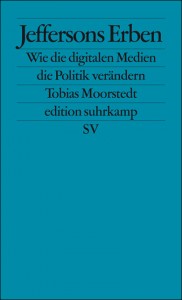
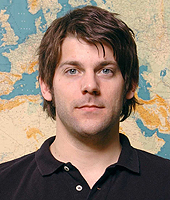
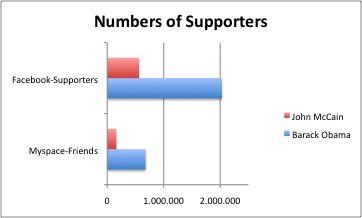
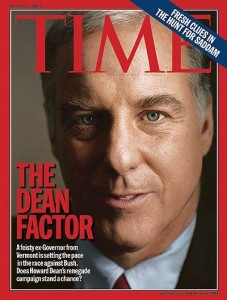
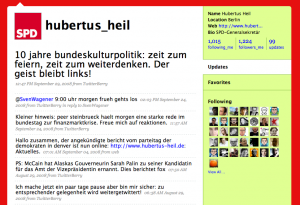
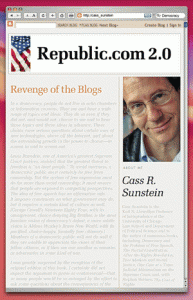

2 Comments, Comment or Ping
Reply to “Politics 2.0 – How the Obama Campaign Won the Internet”
You must be logged in to post a comment.